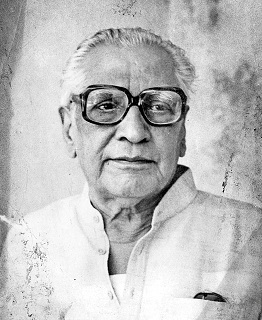Vishnu Vāman Shirwādkar (27 February 1912 – 10 March 1999), popularly known by his pen name, Kusumāgraj, was an eminent Marathi poet, playwright, novelist, short story writer, apart from being a humanist, who wrote of freedom, justice and emancipation of the deprived, In a career spanning five decades starting in pre-independence era, he wrote 16 volumes of poems, three novels, eight volumes of short stories, seven volumes of essays, 18 plays and six one-act plays. His works like the Vishakha (1942), a collection of lyrics, inspired a generation into the Indian freedom movement, and is today considered one of the masterpieces of Indian literature., apart from his play, Natsamrat which has important place in Marathi literature. He was the recipient of several State awards, and National awards including the 1974 Sahitya Akademi Award in Marathi for Natsamrat, Padma Bhushan (1991) and the Jnanpith Award in 1987; he also remained chairperson of the Akhil Bharatiya Marathi Sahitya Sammelan in
He was born in Pune on 27 February 1912 as Gajanan Ranganath Shirwadkar. Upon being adopted, his named was changed to Vishnu Waman Shirwadkar. He later adopted the sobriquet ‘Kusumagraj’. He pursued his primary education in Pimpalgaon and high school education in the New English School of Nashik, which is now called J.S. Rungtha High School of Nashik. He passed matriculation from Mumbai University. In 1944, he married Manorama (née Gangubai Sonawni).
While Shirwadkar was at the H. P. T. College in Nashik, his poems were published in the Ratnakar (रत्नाकर) magazine. In 1932, at the age of 20, Shirwadkar participated in a satyagraha to support the demand for allowing the entry of the untouchables in the Kalaram Temple at Nashik.
In 1933, Shirwadkar established the Dhruv Mandal (ध्रुव मंडळ ) and started writing in a newspaper called Nava Manu (नवा मनू). In the same year, his first collection of poems, Jeevanlahari (जीवन लहरी) was published. In 1934, Shirwadkar obtained a Bachelor of Arts degree in Marathi and English languages, from the H. P. T. College in Nashik.
Shirwadkar joined Godavari Cinetone Ltd. in 1936 and wrote the screenplay for a movie named Sati Sulochana (सती सुलोचना). He also acted in the movie as Lord Lakshmana. However, the film failed to be a success.
He later worked as a journalist. He wrote in periodicals such as Saptahik Prabha(साप्ताहिक प्रभा), Dainik Prabhat(दैनिक प्रभात), Saarathi(सारथी), Dhanurdari(धनुर्धारी), Navayug(नवयुग) etc. 1942 was a turning point in the career of Kusumagraj, as the father-figure of Marathi literature, Vishnu Sakharam Khandekar, published Kusumgraj’s compilation of poetry, Vishakha (विशाखा) at his own expense, and in his preface describing Kusumagraj as a poet of humanity, wrote, “His words manifest the social discontent but retain the optimistic conviction that the old world was giving way to a new one.” Its publication coincided with the Quit India Movement, and carried the message of freedom and stood against slavery, and soon its words became popular with young men and women; in time it was to become his lasting legacy to Indian literature.
After 1943, he started adapting the plays by literary giants like Oscar Wilde, Moliere, Maurice Maeterlinck and Shakespeare, especially his tragedies, and which played an important role in boosting Marathi theatre of the period. This continued into the 1970s when his masterpiece Natasamrat was first staged in 1970, with Sriram Lagoo as the lead. In 1946, he wrote his first novel Vaishnav(वैष्णव) and his first play Doorche Dive (दूरचे दिवे). From 1946 till 1948, he also edited a weekly called Swadesh (स्वदेश).
While temperamentally he ranged from reclusive to exclusive, he had a keen social sense and championed the cause of the downtrodden without involving himself in ground level activities. In 1950, he founded the Lokahitawādi Mandal (लोकहितवादी)(organisation for social good) in Nashik which is still in existence. He also edited certain academic textbooks for school students.
However, Kusumagraj’s main claim to fame was as a poet and writer. In 1954, he adapted Shakespeare’s Macbeth, as Rajmukut (राजमुकुट), ‘The Royal Crown’ to Marathi, it starred Nanasaheb Phatak and Durga Khote (Lady Macbeth) and later he also adapted Othello in 1960 He also worked as a lyricist in Marathi cinema.
His work reflected the changing social milieu, from being the reflection of national uprising during Indian freedom struggle and in the post-independence era it got steeped into rising social-consciousness amongst Marathi writers, which marked the advent of modern Dalit literature.
Shirwadkar was also an active participant in the Samyukta Maharashtra Movement.
(Ref : https://en.wikipedia.org/wiki/Kusumagraj & Nasik Katta)
